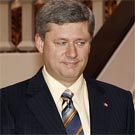Canadian premier pledges Afghanistan pull-out in 2011
 Montreal - Prime Minister Stephen Harper's pledge to withdraw Canadian troops from Afghanistan in 2011 drew the expected barbs from opposition parties but was met with utter silence in NATO capitals.
Montreal - Prime Minister Stephen Harper's pledge to withdraw Canadian troops from Afghanistan in 2011 drew the expected barbs from opposition parties but was met with utter silence in NATO capitals.
Canada became the second NATO country to set a definite pullout date after the government of the Netherlands was first to announce it would be pulling its troops from Afghanistan in 2010.
Harper's pledge, made on Wednesday during the first week of a hotly contested election campaign, goes beyond an agreement he had struck with the opposition Liberal Party in March to save his minority government.
Then, Harper had promised to withdraw Canadian troops from Kandahar province, where Canadians have been battling a bloody Taliban insurgency, leaving room for them to be redeployed to a relatively safer part of the country.
However, Harper insisted Wednesday that Canada is to withdraw from Afghanistan completely, leaving behind only a few military advisers.
"I think that we have to say to the government of Afghanistan: We have an expectation that you are going to be responsible for your own security. We're not there to permanently manage your security," Harper said.
"I don't really think there will be much appetite among Canadians, I don't think even among the armed forces themselves. Although they probably wouldn't say so, [there is not] much appetite to see rotations continuing the way they've been after six years."
Canada has 2,500 soldiers deployed in one of the most dangerous parts of Afghanistan. The Canadian combat mission in Kandahar, which so far has cost the lives of 97 soldiers and one diplomat, the highest per capita number of any NATO country, is opposed by about 56 per cent of Canadians.
The opposition is particularly high, close to 76 per cent, in the French-speaking province of Quebec where Harper's Conservatives need to make inroads if they hope to form a majority government.
The issue was seen as one of the most vulnerable points in the Conservative campaign. Harper's clear pledge on Afghanistan might inoculate the Conservatives from the attacks by the opposition.
The pledge left the opposition parties, which have been calling on Harper's minority Conservative government to withdraw Canadian troops as early as possible, with little else but trying to question his sincerity.
A week ago the prime minister was ambiguous about when we were supposed to leave, said Harper's main rival, Liberal Party leader Stephane Dion.
Even more hawkish Canadian commentators grudgingly agreed that Harper is right to call it quits.
Retired Canadian General Lewis MacKenzie, who commanded UN troops in Sarajevo in 1992, said NATO is failing miserably at the political level to generate the troops required to fight and win the war on the ground.
"Quite frankly we have had soldiers killed as a result of NATO's inability to have enough soldiers to secure the terrain that we win," MacKenzie said. "It's NATO's failure, not Canada's failure." (dpa)